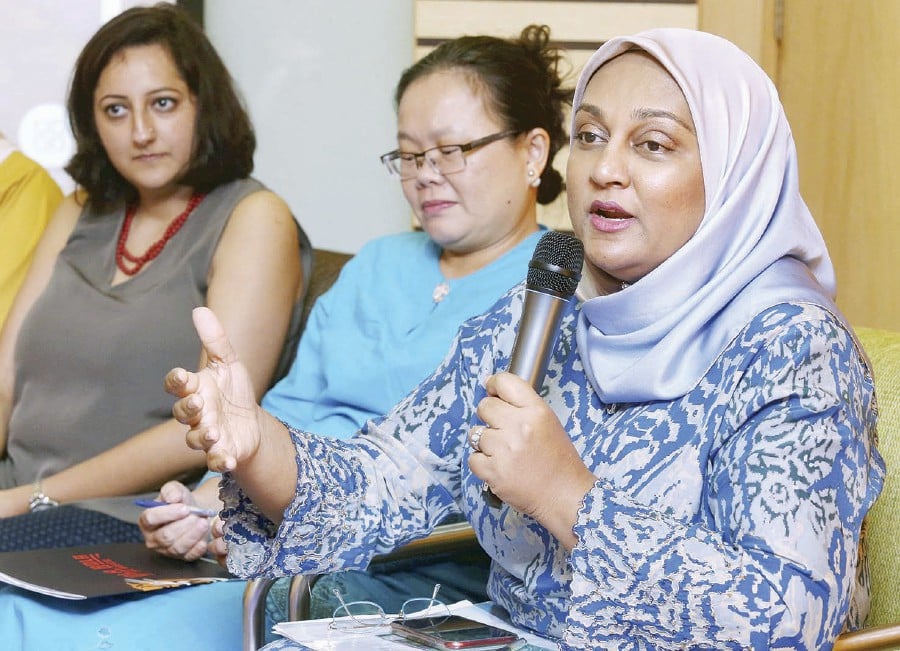 |
| Shahira Ahmed Bazari (right) speaking during the panel discussion. |
THE Trust School Programme, an education initiative under Yayasan Hasanah (Hasanah) with the aim to transform public schools in the country has benefited 83 schools nationwide, 10 of which have been accredited by the Education Ministry.
At the launch of The Hasanah Report 2018 recently, Hasanah managing director Shahira Ahmed Bazari said that it had piloted a state wide education transformation initiative to bring the programme to a bigger scale.
“We have partnered with the Education Ministry in a three-year District Transformation Project in Kedah.
“In this project, we provide training to officers from the State Education Department and District Education Offices in terms of how to manage the schools in the state,” said Shahira, adding that the project is an extension of the programme to bring impact to 64 schools in Kedah.
Since its inception, the programme has been introducing new approaches and addressing gaps in the education system that include strengthening the capacity of state education systems through schools, State Education Department and District Education Offices in the transformation process.
It focuses on four strategic goals, namely to improve teaching and learning quality, develop high quality leadership, maximise student potential and excellence as well as increase stakeholders’ involvement in school activities. The programme employs existing resources such as school leaders, teachers and students with support from parents and the community.
Schools are also given more autonomy to develop their own curriculum delivery, leading to a more student-centric learning process.
According to the report, students became more interested in learning and the rate of absenteeism has declined greatly as a result. The Education Ministry plans to expand the programme to 500 schools by 2025, as stated in the Malaysian Education Blueprint 2013-2025.
In addition to education, Hasanah has expanded its outreach across another four focus areas — community, arts and public spaces, environment and knowledge — since its inception in July 2015.
Shahira said: “Every project that we support has created a lot of value not just for individuals but also the community they are in.
“I realised that what connects all of us can be summed up in one word: people. Human capital development is the common thread tying all our focus areas together. A critical factor for growth is investing in people so that they can develop their full potential.”
The foundation also provides capacity-building and training to 285 school counsellors and administrators to address the rise of mental health cases among children in the nation.
At the media briefing, senior vice-president and education head Dr Nur Anuar Abdul Muthalib said: “We learned from the Education Ministry that mental health problems are affecting more students from lower socioeconomic backgrounds.
“So, we are targeting schools located in People’s Housing Projects areas in Selangor, Penang, Federal Territory of Kuala Lumpur and Johor. Hopefully in the future we can increase the number of counsellors in schools as the current counsellor to student ratio is one to 500,” said Nur Anuar.
To champion inclusive education, the foundation works with Khidmat Nurani Khalifah, a non-governmental organisation to develop and revolutionise a new alternative assessment for students with special needs.
Hasanah also established a design thinking module for students to solve modern daily challenges using arts-, heritage-and culture-inspired solutions.
Fifty schools are incorporating this module in their co-curriculum clubs’ activities.
During the panel discussion, Shahira said that there is lack of public awareness of the country’s valuable assets — the environment as well as the arts and heritage.
“There is a need to create a groundswell of support and accountability for better cities, the protection of our environment and better education for our children,” she added.
Zainariah Johari, senior vice-president and head of arts and public spaces, said: “One of Hasanah’s main missions is to preserve and conserve our crafts so that we can disseminate them to the younger generations.”
The foundation allocates 60 per cent of its funding to education, due to its importance in enhancing knowledge and skills of youths.
Last year, some 300,000 students and teachers from 1,084 schools in the nation gained better access to quality education.
To date, the foundation has worked with 51 civil society partners across the country, supporting long-term projects that have transformed the lives of more than 360,000 beneficiaries.
NST ONLINE

No comments:
Post a Comment